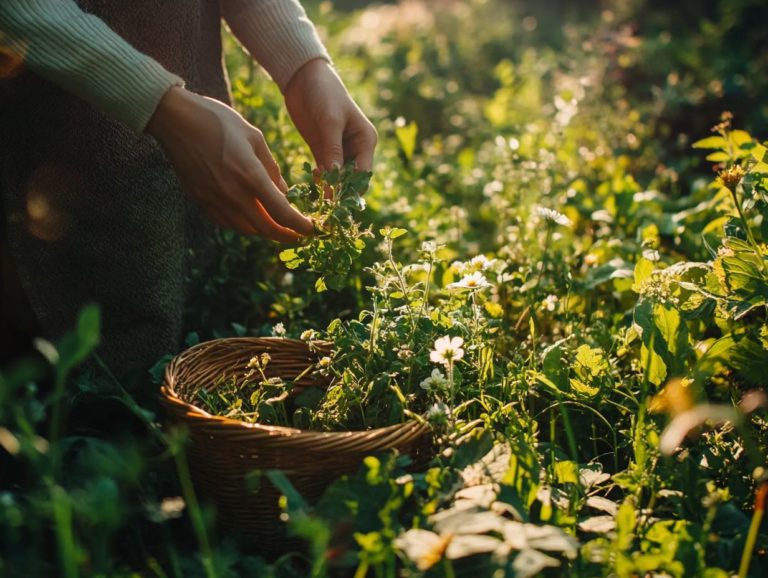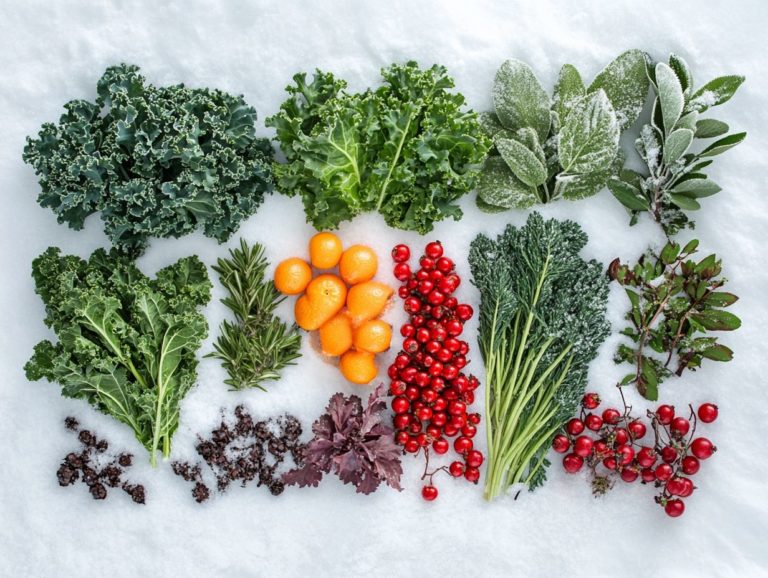What are the Benefits of Sustainable Foraging?
Sustainable foraging goes beyond gathering wild edibles. It s a mindful practice that deepens your connection with nature and fosters ecological balance.
This exploration delves into the essence of sustainable foraging. It emphasizes benefits for both the environment and your health.
You ll find practical tips for foraging responsibly. Learn how to integrate these practices seamlessly into your daily life.
We ll address common challenges and offer solutions. Navigate this fulfilling journey with confidence!
Contents
- Key Takeaways:
- Understanding Sustainable Foraging
- Benefits of Sustainable Foraging
- Sustainable Foraging Practices
- Incorporating Sustainable Foraging into Your Lifestyle
- Challenges and Solutions for Sustainable Foraging
- Frequently Asked Questions
- What are the Benefits of Sustainable Foraging?
- 1. How does sustainable foraging impact the environment?
- 2. What are the benefits of sustainable foraging for local communities?
- 3. Are there health benefits to sustainable foraging?
- 4. How does sustainable foraging contribute to food security?
- 5. Is sustainable foraging important for preserving biodiversity?
- 6. Are there any cultural benefits to sustainable foraging?
Key Takeaways:
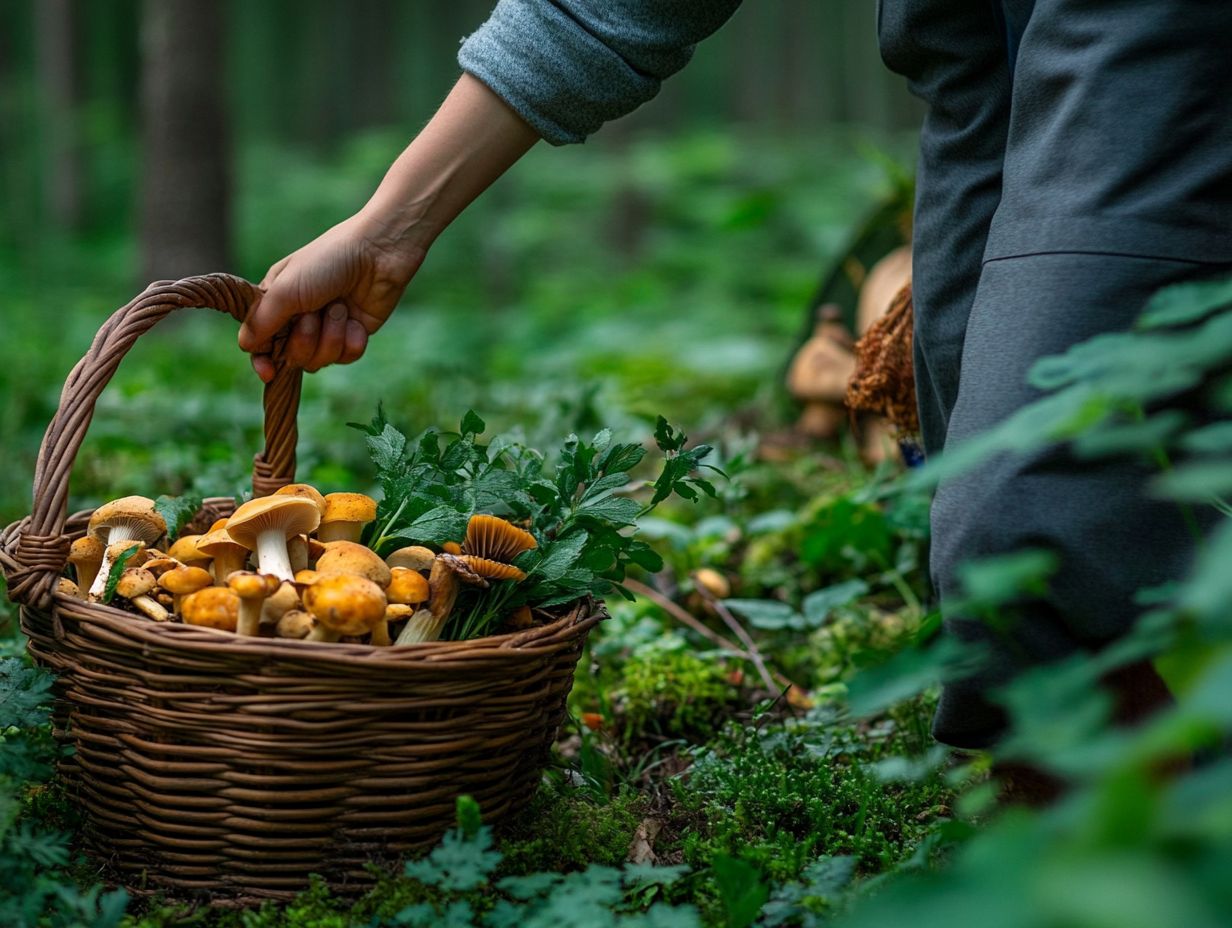
- Sustainable foraging promotes environmental conservation by reducing strain on natural resources.
- Foraging wild, nutritious plants can boost your health and well-being.
- Integrating sustainable practices can be simple and rewarding, like starting a home garden.
Understanding Sustainable Foraging
Understanding sustainable foraging is vital today (the decline of nature s balance). Food deserts create challenges for food security.
By embracing sustainable foraging, you access diverse food sources. You cultivate a deeper bond with nature.
This holistic approach highlights the importance of local vegetation. It significantly reduces the carbon footprint from conventional food production.
Transitioning to sustainable practices helps preserve our natural resources. This ensures future generations enjoy these benefits too.
Defining Sustainable Foraging
Sustainable foraging is about gathering wild foods while preserving ecological balance. It fosters biodiversity within ecosystems.
This approach encourages ethical practices. Respect the natural habitats of plants and animals by only harvesting what you need.
Unsustainable foraging leads to overharvesting, which depletes plant species. Sustainable practices promote mindful collection and awareness of invasive species.
By understanding the ecosystem, you make informed choices. Sustain wild food sources and enhance the environment’s health.
Benefits of Sustainable Foraging
The benefits of sustainable foraging go beyond food supply. They include exciting environmental and health perks that enhance food security and nutrition.
Environmental Benefits
Sustainable foraging offers significant environmental advantages. It reduces your carbon footprint and mitigates greenhouse gas emissions from industrial food production.
This practice encourages biodiversity and supports native plant growth. It helps restore ecosystems disrupted by urban development.
Consider the promotion of food forests. Here, trees and plants thrive in harmony with their ecosystems.
This approach shows how sustainable foraging cultivates richer, resilient landscapes that thrive alongside human communities.
Health Benefits
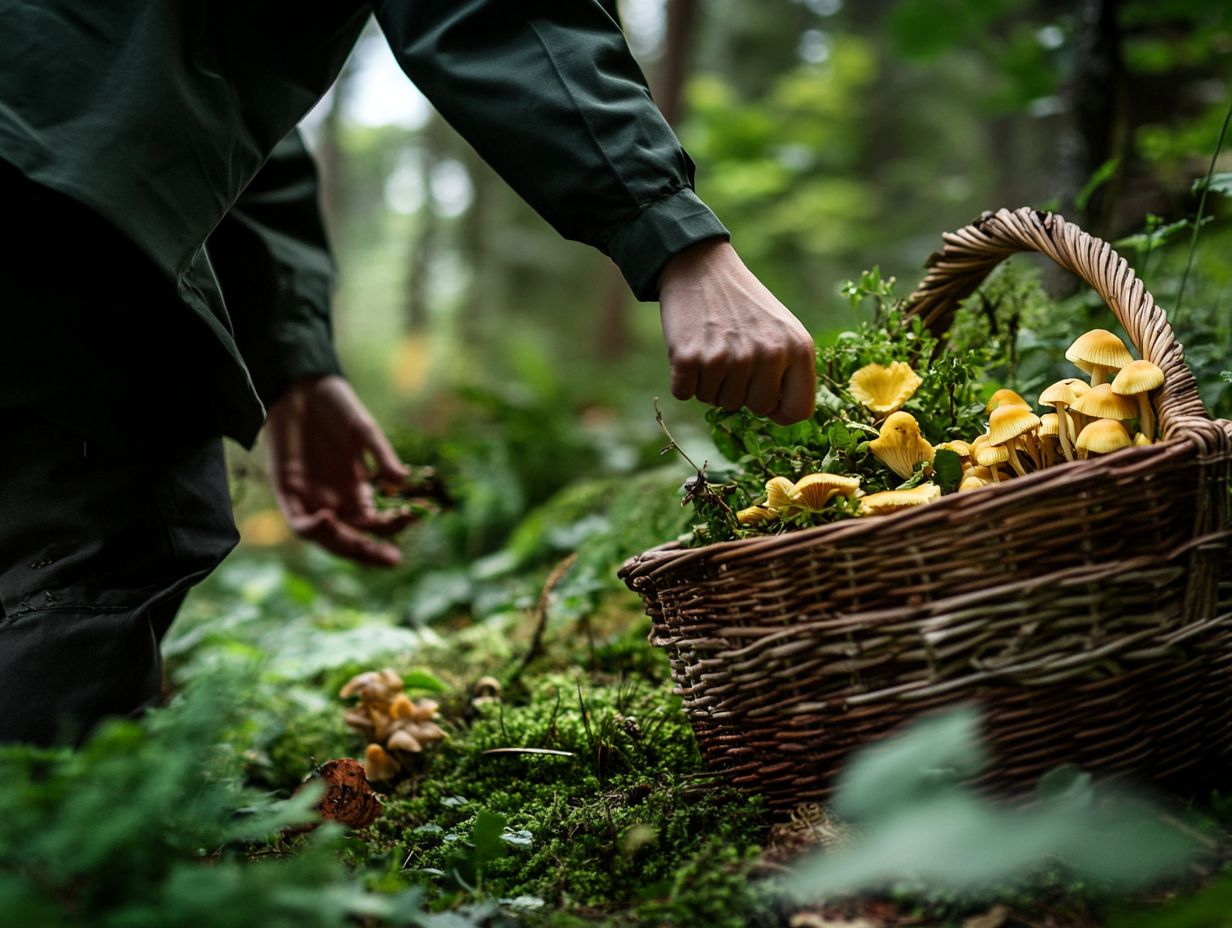
Engaging in sustainable foraging provides many health benefits. You gain access to a rich variety of healthy plants you can eat that enhance your diet.
This practice helps you reconnect with nature. It also fosters appreciation for local ecosystems, revealing foods from the wild that are often more nutritious than cultivated options.
By adding these foraged treasures to your meals, you introduce a rainbow of vitamins and minerals. This can boost your immunity and overall wellness.
Foraging encourages mindfulness about your food sources. It supports sustainable living and reduces reliance on industrial agriculture, contributing to healthier food systems.
Embracing these principles strengthens your bond with the environment. You’ll enjoy greater food security and a deeper understanding of nutritional health.
Sustainable Foraging Practices
Using sustainable foraging practices is vital for protecting the environment. Harvest responsibly to maintain a balance between human needs and ecological health.
How to Forage Sustainably
To forage sustainably, you need to follow ethical practices. This means collecting wild foods without disrupting the ecosystem.
Familiarize yourself with local plants and fungi. Understand their growth cycles and know which species are plentiful or at risk.
Always carry a reliable guidebook or app for identifying edible varieties. This helps you avoid toxic plants.
Only harvest what you need, leaving enough for wildlife and future growth. Join local foraging communities or take classes to learn about ethical practices.
Incorporating Sustainable Foraging into Your Lifestyle
Incorporating sustainable foraging into your life is a delightful venture. It deepens your connection with nature and provides fresh, local foods.
Enjoy the experience of sourcing your food directly from the earth. It s a rewarding way to nourish your body.
Tips for Incorporating Sustainable Foraging into Your Daily Routine
Making sustainable foraging a part of your routine can be enriching. Explore urban parks where various edible plants await your discovery.
Being mindful during your foraging outings enhances personal well-being. You’ll connect deeply with the local ecosystem.
Look for common edibles like dandelion leaves and wild garlic. Learn about their seasonal availability to ensure sustainable harvesting.
Research local foraging groups to meet experienced foragers. They can share their expertise and techniques for mindful gathering.
Challenges and Solutions for Sustainable Foraging
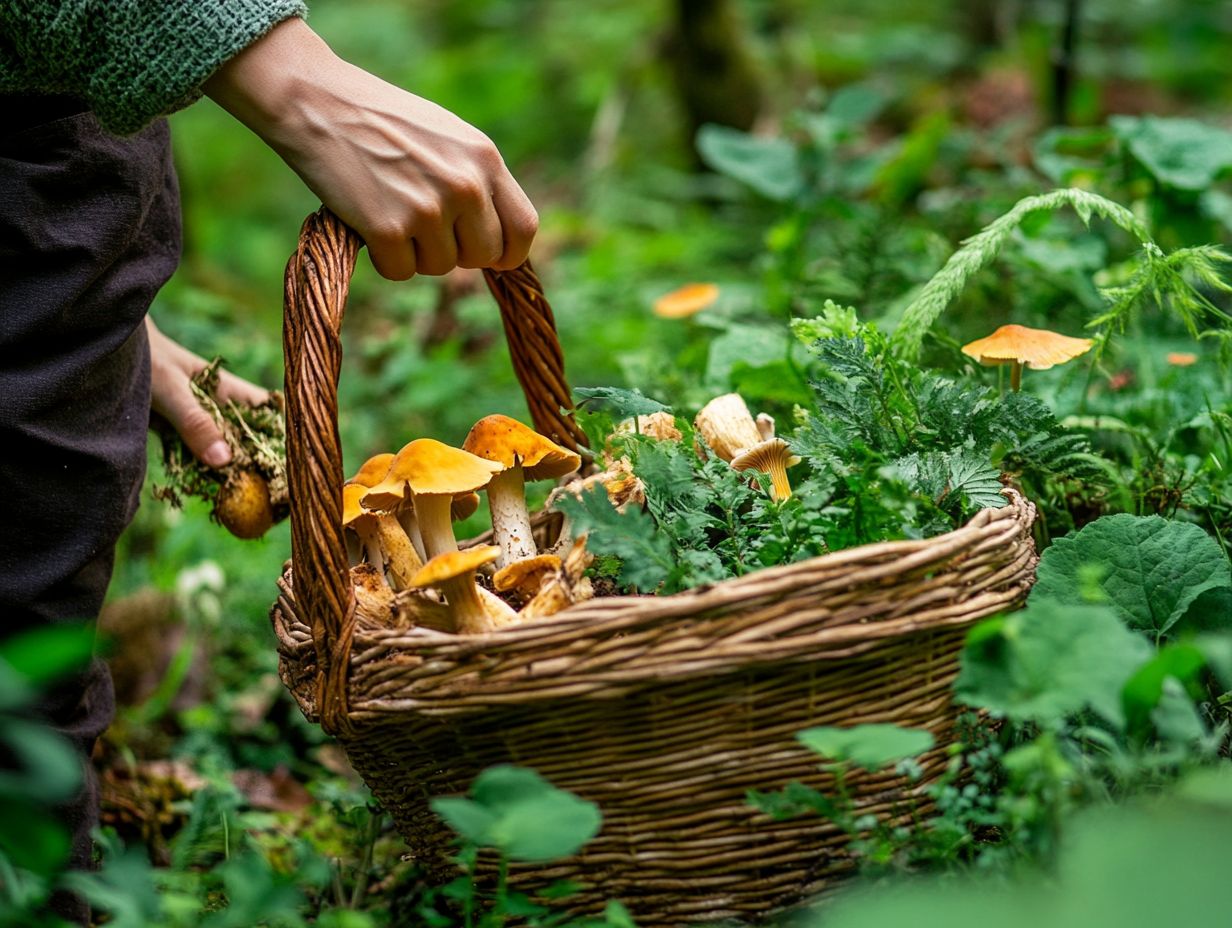
Sustainable foraging has many benefits but also unique challenges. You may face issues like ecological degradation and invasive species disrupting local ecosystems.
Common Challenges and Ways to Overcome Them
Navigating the landscape of sustainable foraging presents some common challenges. These include managing pollution from transportation and addressing food security in communities grappling with food deserts.
Let s tackle these challenges head-on! Consider prioritizing green ways to travel, like bicycles or public transit, when gathering. This approach not only lessens your carbon footprint but also promotes a more sustainable practice.
Engaging in community initiatives can make a remarkable difference. Join local foraging groups that share resources and knowledge, fostering a supportive network.
Incorporating educational workshops can empower individuals to understand the intricacies of foraging. This instills a conservation philosophy that champions stewardship of natural resources.
By nurturing a deeper connection to local ecosystems, you can help cultivate a sense of responsibility and awareness that ultimately enhances food security for everyone involved.
Frequently Asked Questions
What are the Benefits of Sustainable Foraging?
Sustainable foraging is a practice that involves gathering wild plants and animals in a way that does not harm the environment. Here are some of the benefits:
1. How does sustainable foraging impact the environment?
Sustainable foraging helps to preserve and protect natural resources. It involves carefully selecting and harvesting plants and animals in their natural habitat without causing harm or depletion.
2. What are the benefits of sustainable foraging for local communities?
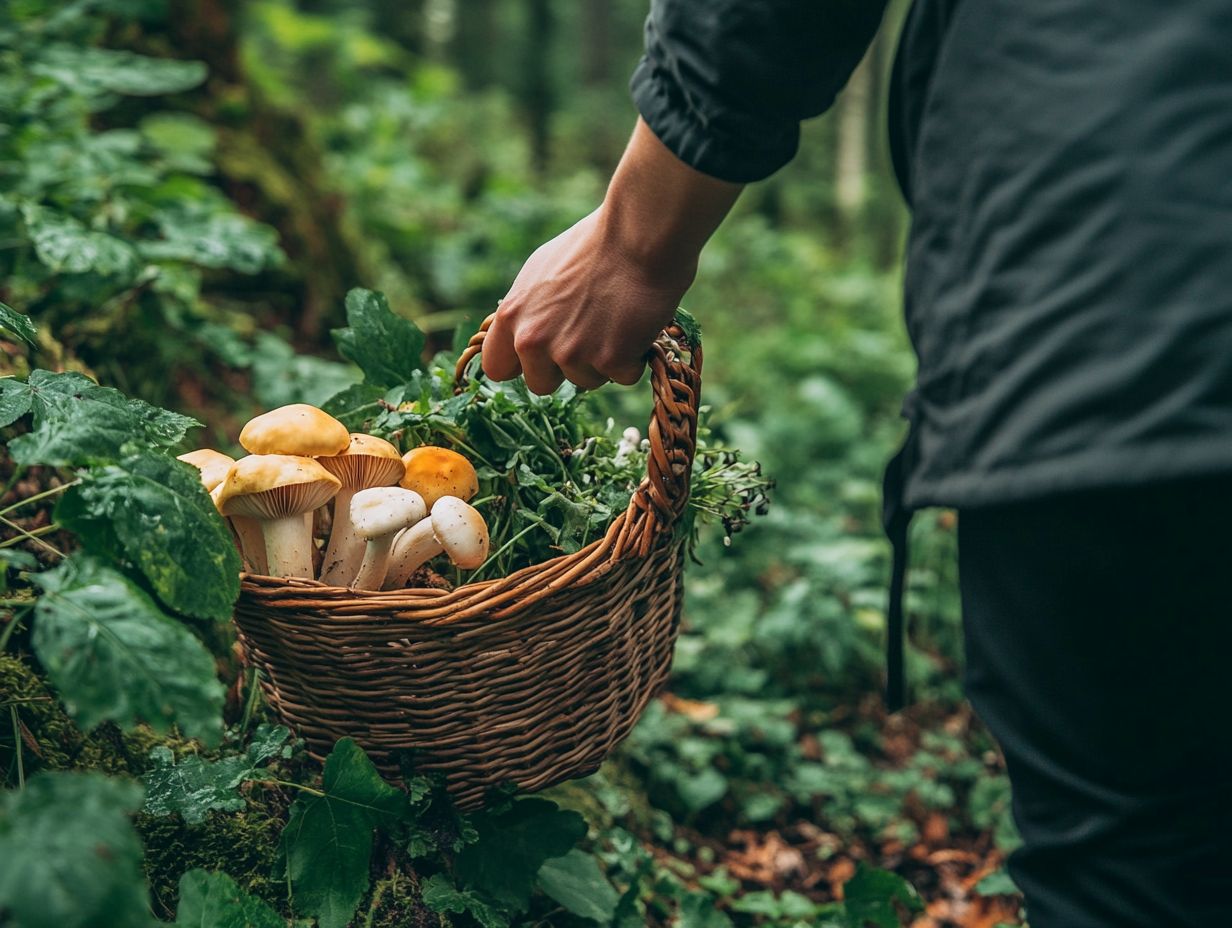
Sustainable foraging can provide a source of income for local communities, especially in rural areas. It promotes the preservation of traditional knowledge and sustainable harvesting practices.
3. Are there health benefits to sustainable foraging?
Yes, sustainable foraging encourages a diet that is rich in fresh, organic, and nutrient-dense foods. This can have positive impacts on overall health and well-being.
4. How does sustainable foraging contribute to food security?
Sustainable foraging can help diversify food sources and reduce reliance on industrialized agriculture. This improves food security by providing a more resilient and sustainable food system.
5. Is sustainable foraging important for preserving biodiversity?
Absolutely, sustainable foraging promotes the conservation of a wide variety of plant and animal species. This is crucial for maintaining biodiversity and a healthy ecosystem.
6. Are there any cultural benefits to sustainable foraging?
Yes, sustainable foraging can help preserve cultural traditions and practices. It also promotes a deeper connection to nature and a sense of community within a culture.
Ready to start your foraging journey?


